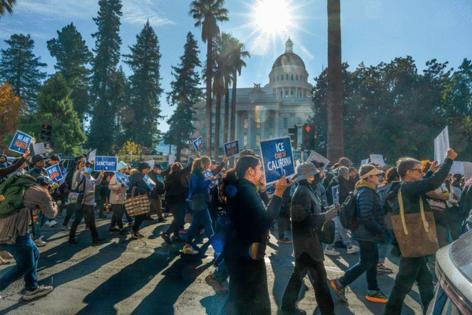Immigrant children face legal cases without lawyers. A California bill could change that
Published in News & Features
SACRAMENTO, Calif. — A young boy leaned forward and held his head in his hands. For several minutes his grandmother had been talking about him with federal immigration Judge Loreto Geisse in a Sacramento courtroom.
Geisse sensed the 11-year-old wasn’t following along closely.
“Are you bored?” the judge asked the boy, who The Sacramento Bee is not naming to protect his privacy.
“Yeah,” he replied.
His grandmother, who the Bee is also not naming, had just finished telling Geisse through a Spanish interpreter that she had so far been unable to find an attorney to represent him.
One she met with was too expensive. And a church group that offers to help immigrant children in court said it could not take on her grandson’s case at this time because it was working on too many other ones. His name was added to a waitlist.
Sometimes the boy gets sad and fearful, the grandmother continued, explaining to the judge why he may look uninterested.
“Don’t be scared,” Geisse said. “The government cannot remove you until I tell them they can.”
Unaccompanied minors under Trump
The boy was the 12th and final child, or young adult who had arrived in the U.S. as a child, to appear before Geisse last Wednesday. All had been taken into custody by immigration authorities before they turned 18 years old without a parent or guardian with them, and were considered unlawfully in the country.
If the federal government wants to remove them, the youths have a chance to go through a legal process where they can argue for why they should stay. Federal law also allows them to have access to a lawyer. But it does not require that they be provided one.
None of the young people who appeared before Geisse on Wednesday had a lawyer.
Congress in 2008 passed a law that said the federal government, to the “greatest extent practicable,” will ensure that all unaccompanied immigrant children have lawyers to represent them in court.
But the Trump administration in a March letter notified the organization that coordinates legal representation for children across the country that it would stop paying for that service. The move is being challenged in a California federal court and a judge has ordered the government to keep funding the legal support while the case continues.
Still, as was clear Wednesday, many children don’t have lawyers. That left it up to Geisse to explain the complicated aspects of immigration law to the children, and the adults who came with them.
If a young person moves, both the court and U.S. Immigration and Customs Enforcement need to be notified of the new address. If they are applying for asylum, their paperwork has to be submitted in a certain way. If they don’t appear at court hearings, the judge could order the youths removed from the country.
“That’s why it is important you get a lawyer as soon as possible,” the judge said, as two children waited for their cases to be heard.
One was a boy, 7, who yawned as he sat on a wooden pew-like bench in the courtroom while the judge spoke. His feet, which he kicked back and forth while waiting for his case, did not reach the ground.
The boy was accompanied by a volunteer from NorCal Resist, a local activist organization. The volunteer took notes while Geisse spoke and planned to pass along the information to the child’s sponsor.
California lawmakers respond
Assembly member Mia Bonta, an Oakland Democrat, in February introduced Assembly Bill 1261, which would require the state to pay organizations to provide a lawyer to all unaccompanied immigrant children in California.
During the last fiscal year, alone, more than 10,800 of them were released into the care of family members and other sponsors across the state after they were taken into custody by immigration authorities.
A legislative staff analysis estimated that Bonta’s bill could cost more than $37 million annually. The measure is awaiting a key vote in the Assembly Appropriations Committee later this month.
“At a minimum, we should be able to provide support and legal representation to our children that are unaccompanied minors,” Bonta told the Bee.
Back in Geisse’s courtroom Wednesday, the judge noted a 10-year-old’s maroon and yellow scarf before diving into his case.
“You a big Harry Potter fan?” Geisse asked.
“Yeah,” the boy said.
“Me too,” the judge replied.
Shortly after, Geisse moved on to more serious matters with the boy’s stepfather. The child had been in the country for two years already and still didn’t have a lawyer.
Why not? The judge asked.
The stepfather, through a Spanish interpreter, said he had contacted organizations on a list provided by the immigration court, but that people he spoke with just gave him phone numbers for other groups to call.
Though, the stepfather said he had good news: He had a meeting with a lawyer planned for later in May.
The judge was pleased.
“It is very difficult to find a lawyer these days,” Geisse said. “You’re lucky to even find an appointment.”
_____
©2025 The Sacramento Bee. Visit sacbee.com. Distributed by Tribune Content Agency, LLC.







Comments